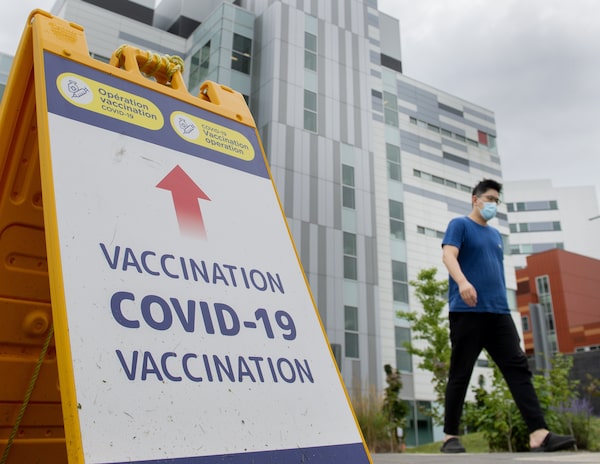
A man wears a face mask as he walks by a COVID-19 vaccination sign in Montreal on Aug. 1.Graham Hughes/The Canadian Press
Earlier this year, there was hope that a vaccination rate of just 75 per cent would be enough to beat back the pandemic. Then the Delta variant upended that calculus.
This page has for months urged Canada to aim higher – 90 per cent. That’s because this country’s current level of vaccination, though among the highest in the world, is not likely to be enough to quell the threat from the ever-shifting coronavirus.
Yet even as the need to up Canada’s vaccination rate becomes clear, the pace is falling off. The pool of the unvaccinated – about six million eligible Canadians – has barely shrunk over the past month.
Carrots have been tried. It’s now time to start making vaccination a condition for working in high-risk fields or spending time in high-spread settings. These should not be suggestions. These should be the law.
Yes, you should have to be vaccinated to work in health care, or long-term care, or elder care. Yes, you should have to be vaccinated to work in education. Students in Ontario and New Brunswick must be vaccinated against many illnesses before starting school; COVID-19 should be added to the list for those aged 12 and over, across the country. Yes, vaccination should be a condition of on-campus university or college attendance. Yes, it would be reasonable for federal and provincial governments to make vaccination a condition of employment for public sector jobs involving congregate settings, or close contact with the public.
And yes, some indoor activities should be reserved for the vaccinated. If you want to be among the 18,000 people attending an NHL or NBA game, or going to a concert, prove that you’ve been vaccinated. Other settings such as gyms and nightclubs should have similar conditions.
From early March, when ample shipments of vaccine started to land in this country, through mid-June, Canadians rushed to get their shot. Then, the pace slowed to a crawl. Slightly more than 81 per cent of Canadians age 12 and over have had at least one shot. But that figure is rising by less than 1 per cent a week.
And the most social age groups – those in their teens, 20s and 30s – are the least vaccinated. More than one in four Canadians aged 18 to 39 is unvaccinated.
The latest modelling from Ottawa focused on the impact of raising the vaccination level among that group. If it remains where it is – a first-shot rate of 72 per cent – hospitals could be overwhelmed this winter. But if it hits 80 per cent, the model says the number of people in hospital is likely to be far lower.
Vaccination is the firewall against a coming fire. The more Canadians are vaccinated, the fewer Canadians the next wave will put in the hospital. It’s that simple.
While this page has for weeks called for vaccination to be required in work such as health care, and polls show strong support for such measures, political leaders have been hesitant. That is quickly beginning to change.
Last Thursday, Quebec Premier François Legault said the province will soon require proof of immunization for many activities. The same day, Prime Minister Justin Trudeau said he was considering vaccination requirements for federal workers and those in industries regulated by Ottawa, such as airlines. U.S. President Joe Biden late last month issued rules obligating federal workers to attest that they’re vaccinated, or be subject to safety protocols, including regular testing.
Meanwhile, Carleton University last week said vaccination will be required to play sports, take some music classes, or live in residence. Only one Canadian college has made vaccination mandatory, but many U.S. universities have, along with a growing list of U.S. employers. CNN fired three people for coming to work unvaccinated. Canada is a laggard.
With a vaccination campaign stuck in neutral, nudges are necessary. In Quebec, 11,519 people signed up for a first jab – double the number the day before – after the province announced its new rules. A bigger jump happened in France in mid-July – 1.3-million sign-ups in a single day – after it promised a similar regime.
You can choose to be unvaccinated, just as you can choose to smoke. But you can’t smoke – and you shouldn’t be able to go unvaccinated – anywhere and everywhere.
Sign up for the Coronavirus Update newsletter to read the day’s essential coronavirus news, features and explainers written by Globe reporters and editors.